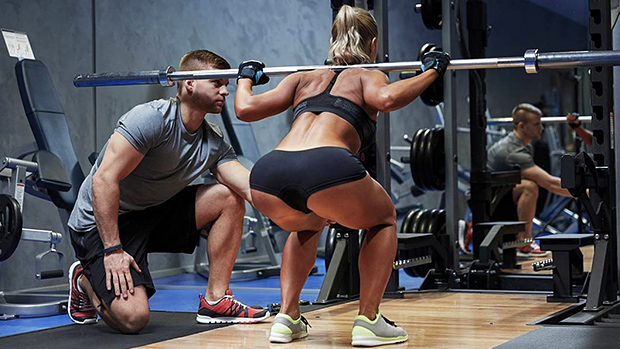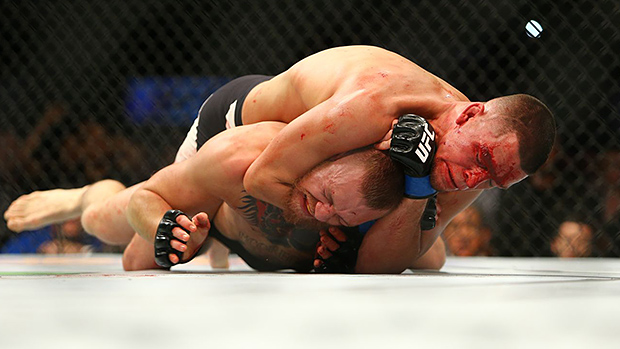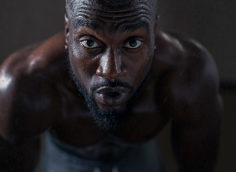Editor's Note: This article contains some erotic photography.
A Thousand Words
You're not supposed to be here. In this motel room, in this bathroom, backstage at this show. You aren't supposed to be seeing this. This private moment, this intimate setting, this unguarded emotion.
But you are seeing it. And although the photographs are silent, you can hear their stories, whispering somewhere at the back of your skull. And you can't help but listen. Desire or disgust, empathy or envy, the stories move you.
Not many photographs have this effect on us. In muscle culture, this visceral reaction has almost been forgotten. Most of today's bodybuilding photography tells no story and offers no insight. It's generic, vanilla, silent, or just plain boring.
But in the last few years, several photographs have caught my attention: a fitness model smoking a cigarette in a seedy hotel room; an enormous black bodybuilder catching a cab in the rain wearing nothing but his posing trunks and flip-flops; an aging porn star sitting on the toilet.
For whatever reason, these photos made me look twice, caused me to hear those thousand words every picture is supposed to be worth, but seldom is. I recently learned that all of these strangely compelling photographs were channeled by the same medium: Brian Moss.
Brian usually lets his photos do the talking, but we recently tracked him down in New York City for an exclusive interview.
 |
T-Nation: Brian, why is it that we can look at a thousand photos and know exactly which ones are yours?
Brian Moss: I think that when a photographer doesn't have a point of view, then the work is flat. I think there are some photographers that spend their whole lives looking for their point of view. It's funny, it's like no matter what I shoot, whether it's my five year old nephew or a 300 pound bodybuilder, people tend to be able to recognize my point of view.
 |
T-Nation: Is this point of view development something you actively pursue or is that something innate within the artist?
Moss: No, I don't think you pursue it at all. I think it just finds you and off you go. I never think about it. It's just something intuitive.
T-Nation: You actually discovered photography pretty recently, around 1997?
Moss: Yes, totally by accident. I was a gym owner. I did that for 16 years and probably thought I'd do that my whole life. I was sort of an accidental gym owner and then an accidental photographer.
T-Nation: What brought you into the bodybuilding world to begin with?
Moss: My first interaction with weights was probably as a sophomore or junior in high school. I remember watching the series Kung Fu and seeing David Carradine fight this guy who had an amazing physique. He wore this sleeveless shirt and he was swinging chains. That just started my journey. I wanted to learn how to get those arms!
I had no pride. I'd go up to a big guy on the beach and ask him what he did for his arms. I was 13 or 14 years old. Unfortunately in New York at the time, there was no such thing as a gym. As teens we'd ride our bicycles to this high school that had a Universal machine. I later went to Syracuse, and you'd think they'd have a monster weightroom, but not in 1976.
 |
T-Nation: The real bodybuilding movement was mostly taking place on the other side of the country, right?
Moss: It was both. Clearly it's a West Coast based thing, but there was some stuff going on in New York. It seemed to be lead by the gay community for whatever reason. Gay men have always been way ahead of the curve when it comes to hardcore training.
In New York City there was no real place you could go to train hard. It was all health clubs. You had to go to the men's gyms to train hard with weights. There were gay and straight men there of course, but no women. That was the genesis of the idea to open up Better Bodies.
 |
T-Nation: While you were the owner of Better Bodies you rediscovered photography, right?
Moss: Yes, I'd been into bikes my whole life and I'd built this beautiful custom Harley. I wanted desperately to get it into a bike magazine. Now, I knew a lot about the muscle publication world because I'd been hosting the magazine's photo shoots in my gym for fifteen years, so I saw how they worked. I knew if I did all the work and delivered the whole shoot, my odds would be much greater at getting my bike in a magazine.
So I took it upon myself to hire a topless girl, because in the biker magazines it's all about tits as well as bikes. So I found the girl, got a cool location and literally used this point and shoot camera. It just flew. It felt very natural. I shot the bike, shot the girl, shot the girl without the bike, and it just felt really good.
People laugh and say, "Of course it felt good to shoot a naked girl!" But I was serious about it. I was trying to get cool images, not disposable images. And it got published.
T-Nation: So you naturally starting eyeing subjects that you saw daily in your gym.
Moss: Yes, I then took some of those images and showed them to Sharon Bruneau and Erica Kern, my friends at the time and big names in the sport. I asked them if they'd like to shoot. As soon as they saw the work they thought it would be cool to do something different. So I shot a few of those girls. Muscle & Fitness loved the shots and hired me.
I'd started this hotel/motel series before, where I shot girls in hotel rooms, and Muscle & Fitness asked me to do that at the Arnold. I said it was perfect. It's what I like; I'm a voyeur. I just want to tiptoe in, be a fly on the wall and show the public things they don't normally see.
So I went and shot ten girls in three days, alone with no assistant. I knew nothing! I knew how to find the picture but I didn't really know anything else.
 |
T-Nation: Did you have a formal education in photography?
Moss: Zero. I still don't.
T-Nation: That's probably a good thing.
Moss: I think you're right. There's no harm in having a strong technical background, but if I had to choose one or the other I'd choose soul rather than technical. There are a lot of photographers, especially in our industry, that are technically perfect, but their pictures feel very vapid to me. They don't move me. They're very derivative, you know, everybody copied from the guy before them. Then they got into a groove and continued to shoot the same way for twenty years. It just looks very interchangeable. So I kinda like the fact that I don't know much, that I had to learn on the fly.
So I sent the stuff off the Muscle & Fitness and they loved it. They loved that it was black and white. Seven or eight years ago, you just didn't see that in muscle magazines. So they ran the feature. It was called "Behind Every Door" and people still remember it to this day. So they put me under contract and I worked for them for seven years.
T-Nation: Interesting. You shoot a lot of really muscular women for your site, SheMuscle.com. Really muscular women. The general public is fascinated by these Amazon women, mostly from a freak or oddity perspective and sometimes from a fetishistic perspective. What's the draw there?
Moss: Well, it's not popular in terms of being mainstream. It is what it is. It's always been there; it's nothing that we created. It's just that we're able to feed it with the Internet. We can grow it a little bit because we're able to create the content that satiates that desire. The Amazon scene isn't big, but they have a zealot following. It'll never be mainstream. Same with the men, although they have a little more crossover appeal. But it is what it is: a subculture.
 |
T-Nation: As an artist, you seem to really enjoy the lure of subcultures, be it bodybuilders, gearheads, or strippers.
Moss: Yeah, I like the fringes and the marginalized communities. They're untapped and sometimes they're not particularly respected. It's much more challenging to go into a battleground like that and try to make sense of it than to, say, go shoot the Dallas Cowboy Cheerleaders or something.
T-Nation: Subcultures are always fascinating, and of course bodybuilding itself is a marginalized community.
Moss: Yes, and even that's split up because you have some people who just like the men, some who just like the women, and it just goes on and on. There are subsets of subsets of subsets.
T-Nation: Your settings are often intimate: bedrooms and backstage, for example. How important is setting in your work?
Moss: I think it's everything. It's critical; it's all about context. Typically when people are doing erotic work or sexy images, somehow they end up in a studio. You can't create something intimate in a studio! So for me it's all about bedrooms, hotel rooms, and motel rooms.
And for bodybuilding it's all about backstage rather than onstage. We've seen what's going to happen on stage a million times. There are no surprises on stage, nothing, therefore there's no interest for me. All the surprises happen backstage or in their rooms.
 |
T-Nation: These backstage photos of yours seem to have the appeal of reality TV in a way.
Moss: It is a reality, and it's never been seen before. Even when people were shooting backstage, they weren't going for the moments that interested me. What happens is a photographer goes backstage where the bodybuilders are pumping up. The bodybuilder sees the camera, puts down the weights and gives the thumbs-up. I'm like, don't give me the thumbs-up! I'm invisible, just do what you do.
Jay Cutler calls me the photographer that doesn't speak, meaning that I don't prompt, guide, or direct them. When I was doing these kinds of photos, the bodybuilders learned to just do what they needed to do and not look at me. They knew I didn't want to see them smile, didn't want the thumb-up and didn't want the peace sign. There was a lot of trust. I've been in the industry for almost twenty-five years and that trust allows me to get what I get.
 |
T-Nation: Some of your most interesting photos were taken on the set of a porn movie. Tell us about that.
Moss: That was an amazing challenge because it was done for mainstream media (Gear magazine). I could shoot whatever I wanted, no matter how explicit, but of course they can't publish that. So I had to convey the fact that I was on a porn set without showing the obvious. That's where the challenge was and that's where it was fascinating for me.
 |
T-Nation: What's sexier in photography, nudity or implied nudity?
Moss: I'd have to say that I like shooting with no limits, no boundaries. Some of best shots that are implied or partial come as a result of full nudity. It's sort of like you need to go 120 miles per hour in order to back down and get a good picture at 90 miles per hour.
So if you go into a shoot and a girl is very distracted by staying implied, it changes the dynamic and the energy of the shoot. I'll never push someone's boundary if it's implied, but I tell them not to be too concerned if something pops out here and there; we just won't use it. It frees them up a little bit.
 |
T-Nation: Have you ever had a model go too far during a shoot?
Moss: No, I love that. And if I can't use it, then maybe they can. I'll shoot anything; I won't censor myself. I love being pushed; you can't go too far for me. I want to confront myself with something uncomfortable. As an artist you have to confront yourself with things that aren't from your world or things that are out of your comfort zone.
I've worked with a senior citizen stripper and BBW, plus-sized women. I shoot a lot of amazing bodies, but bring on a 200 pounder... What do I do? How do I feel as a man? How do I feel as a photographer? So, I like to do that. I like to confront myself.
 |
T-Nation: Ansel Adams once wrote that a photograph is usually looked at, but seldom looked into. When someone looks into your photos, what do you want them to see? What emotions do you want to elicit?
Moss: It's up to them. I don't want to lead people in any certain way, because I'm not directing the shot. I make a distinction between taking pictures and making pictures. When I did Milos Sarcev as Elvis, I was making a picture. When I shoot Jay Cutler collapsed on his bed the day before the Olympia, that's taking a picture because I didn't guide him. I just walk in and let people do what they do.
In my style of photography, I don't want to lead you necessarily, but I'm hoping the image can transcend the content, meaning make it bigger than it is and make a statement about something, such as the drama of bodybuilding or of any person in a competitive event. I hope the images transcend the subject matter.
 |
T-Nation: When this is published, we'll probably get some violent reactions to the images of the really steroidal women. Does that bother you in any way?
Moss: I can't control people's reactions. I photograph what I photograph and people will do what they do to the images, whether that's good or bad.
T-Nation: Right. So some guy may throw up and some guy may masturbate.
Moss: That's right, but there's no figuring for that. You can take a picture of a lawnmower and somebody could probably masturbate looking at it. Once you accept the fact that people can sexualize and fetishize everything, then you can kinda let go.
I remember once I did this really amazing photo shoot with this beautiful young pregnant girl. I'd never even seen a naked pregnant girl! Well, Nerve.com ran it and it was really interesting to see people's reactions. When the editor interviewed me for it, he posed that question: what if people eroticize this? Well, I can't stop that. Some people, all they want to do is look at a pregnant woman or a lactating breast, and they're fetishizing it. Others who've maybe experienced it see how amazing it is and what a truly sexual being a pregnant woman could be. I can't control that stuff, so I don't worry about it.
 |
T-Nation: Speaking of fetishes, I notice you have a lot of girls smoking cigarettes in your pictures. This is a sexual fetish in and of itself, right?
Moss: Absolutely. Not only is smoking a fetish, but muscular women smoking is like a sub-fetish! I have people from all over the world email me asking what bodybuilders I have that smoke. They don't want any woman smoking, but a muscular woman smoking.
 |
It never stops. I remember once I got an email asking for galleries of women's underarms. Wow, underarms. Who would think of underarms? So I fired back an email saying that if you look at women doing front double-biceps, there you have it.
Then there are foot fetishes, which is very mainstream. It's generally about pretty feet. But even that just isn't about feet. I had an email asking me to get the models to pose with the soles of their feet facing the camera!
T-Nation: With your SheMuscle.com site, you must interact with a lot of men who like muscular women. Now, these guys don't like simply fit women, but have to have a masculine, heavily muscled woman. Where does that fetish come from?
Moss: Clearly there's more to it than it appears. It's not just superficial, like they woke up one day liking muscular women. I'm convinced all these things are determined early in their lives and possibly influenced by several things that create this. That's true of all fetishes. Nothing happens by accident.
When you talk to the women about these men, they'll tell you the fascination seems to be about muscle worship, where they're really worshipping the muscle on these women. Clearly they couldn't get that from a smaller woman.
 |
T-Nation: Many of these fetishes seem to attract a group of men you wouldn't suspect, such as Fortune 500 executives who like to be diapered and treated as babies.
Moss: Yeah, it's called infantilism. Muscular woman play very well in infantilism because part of it is being picked up and carried. A skinny little girl can't do that for you, but a strong woman who can pick you up and carry you around is perfect.
T-Nation: I've read about that. I understand there's a "lift and carry" fetish.
Moss: Yes, and that's even different that infantilism. "Lift and carry" is its own fetish. I had one guy who liked the lift and carry stuff, and he asked if I could shoot women lifting other women. He also liked seeing women smother plushy toys, like stuffed animals. There's a plushy fetish out there, where people dress up as these stuffed animals. It's endless... thank God! [laughing]
T-Nation: Let's talk about some of your more interesting photos, the odd pairings for example, like bodybuilders dressed as clowns or catching cabs in their posing suits.
Moss: I call those "concept" stories. I have a weird concept and I just try to breathe life into it using bodybuilders. I'm always fascinated by incongruity. A lot of my work speaks to the incongruity of life.
 |
T-Nation: How do you come up with these ideas? Is there a moment of epiphany?
Moss: I guess there is but I don't think I could ever point to it. It just sort of evolves somehow in my mind. I just try to expose myself to as much stuff as possible, whether it's thumbing through magazines or keeping the TV on. From all that media bombarding me, some things make it through the noise and come to the surface, and then off I go.
 |
T-Nation: Tell us about your Women During Sex series, which I understand you've been shopping around as a book.
Moss: That sort of spun out of shooting nudes, and shooting some girls that had less boundaries than others. It turned from masturbation to orgasm, and it just seemed fascinating to shoot orgasm.
But, again, not in an expected way, meaning that it wasn't shot at the crotch. That's really not where the action is. The real action is their eyes rolling back in their heads or their toes curling. You can just look at these other things and know what's going on.
T-Nation: Now that's thinking outside of the box! Now, since you've been involved in bodybuilding since the early 1980's, what do you think of the state of pro-bodybuilding today?
Moss: It's dreadful. Terrible. I think it's ready to self implode. The steroid issue is front and center now, where for years it was a dirty little secret. Now George Bush is talking about steroids in the State of the Union address.
I know it sounds cliché, but when I was a teenager the physiques in the magazines seemed obtainable. I don't think teenagers today are wanting to be bodybuilders. I can't imagine a kid picking up a magazine, seeing the top guys, and thinking he could do that. I don't think it's inspirational.
I'm not knocking the guys and the hard work, but I'm afraid that within a year somebody is going to drop dead onstage. We've had guys unfortunately drop dead in their hotel rooms, and I've seen them almost drop on the side of the stage. I just think it's going to implode unless the powers that be do something. But it's like getting the cat back into the bag. I really don't know if you can go backward.
 |
T-Nation: Haven't some of the ruling federations asked the competitors, especially the women, to drop their muscle weight by 10%? It sounds like they're asking the competitors to back off the drugs a little.
Moss: We've heard that before. That used to happen in female bodybuilding before there was fitness and figure, but I've never seen a change. They're not consistent. Maybe they say to do that, but then they don't reward those physiques, so the competitors are being bounced around as to what the proper aesthetic is.
T-Nation: Agreed. Where can T-Nation readers go to see more of your work?
Moss: For my commercial work, they can just go to BrianMoss.com. For my erotic work, they can go to SheMuscle.com.
I also have BackstageMuscle.com, but it's just a coming soon page that's been up for two years. Once SheMuscle took off I needed to focus my efforts on that. But I'd love for people to see my backstage work. Ironically, it's never really been published by Muscle & Fitness or Flex, and I just don't know why.
The only thing I can surmise is that maybe it portrays... well, not the darkness of bodybuilding, but it just isn't about shiny happy people backstage. Most images you see in the magazines are about perpetuating that image of shiny happy people. I can only think that's why it doesn't make it, because it's too honest. I think it's important to show what I do because it humanizes people.
 |
T-Nation: Thanks for the fascinating talk, Brian. We look forward to seeing more of your work.
Moss: Thank you, Chris.
 |




